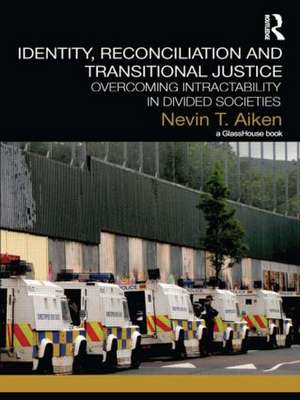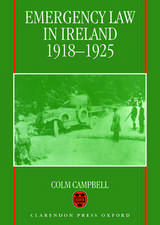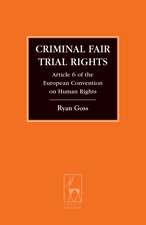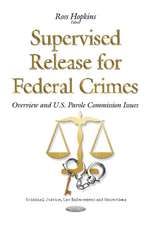Identity, Reconciliation and Transitional Justice: Overcoming Intractability in Divided Societies: Transitional Justice
Autor Nevin Aikenen Limba Engleză Paperback – 4 iun 2014
| Toate formatele și edițiile | Preț | Express |
|---|---|---|
| Paperback (1) | 487.37 lei 6-8 săpt. | |
| Taylor & Francis – 4 iun 2014 | 487.37 lei 6-8 săpt. | |
| Hardback (1) | 1059.18 lei 6-8 săpt. | |
| Taylor & Francis – 16 ian 2013 | 1059.18 lei 6-8 săpt. |
Din seria Transitional Justice
- 9%
 Preț: 936.84 lei
Preț: 936.84 lei -
 Preț: 330.37 lei
Preț: 330.37 lei -
 Preț: 189.54 lei
Preț: 189.54 lei - 15%
 Preț: 289.21 lei
Preț: 289.21 lei - 18%
 Preț: 999.82 lei
Preț: 999.82 lei -
 Preț: 413.33 lei
Preț: 413.33 lei -
 Preț: 446.37 lei
Preț: 446.37 lei - 18%
 Preț: 1000.27 lei
Preț: 1000.27 lei -
 Preț: 449.41 lei
Preț: 449.41 lei - 26%
 Preț: 847.73 lei
Preț: 847.73 lei - 14%
 Preț: 312.77 lei
Preț: 312.77 lei - 19%
 Preț: 268.10 lei
Preț: 268.10 lei -
 Preț: 409.48 lei
Preț: 409.48 lei -
 Preț: 413.33 lei
Preț: 413.33 lei - 18%
 Preț: 1057.57 lei
Preț: 1057.57 lei -
 Preț: 413.33 lei
Preț: 413.33 lei -
 Preț: 489.26 lei
Preț: 489.26 lei -
 Preț: 389.38 lei
Preț: 389.38 lei -
 Preț: 413.33 lei
Preț: 413.33 lei -
 Preț: 469.34 lei
Preț: 469.34 lei -
 Preț: 407.57 lei
Preț: 407.57 lei -
 Preț: 462.60 lei
Preț: 462.60 lei -
 Preț: 434.41 lei
Preț: 434.41 lei -
 Preț: 485.46 lei
Preț: 485.46 lei -
 Preț: 439.43 lei
Preț: 439.43 lei - 18%
 Preț: 1117.43 lei
Preț: 1117.43 lei - 18%
 Preț: 1060.25 lei
Preț: 1060.25 lei - 26%
 Preț: 764.20 lei
Preț: 764.20 lei -
 Preț: 444.62 lei
Preț: 444.62 lei - 18%
 Preț: 1062.62 lei
Preț: 1062.62 lei
Preț: 487.37 lei
Nou
Puncte Express: 731
Preț estimativ în valută:
93.26€ • 97.63$ • 77.16£
93.26€ • 97.63$ • 77.16£
Carte tipărită la comandă
Livrare economică 05-19 aprilie
Preluare comenzi: 021 569.72.76
Specificații
ISBN-13: 9780415812375
ISBN-10: 0415812372
Pagini: 288
Ilustrații: 1 black & white illustrations
Dimensiuni: 156 x 234 x 15 mm
Greutate: 0.41 kg
Ediția:1
Editura: Taylor & Francis
Colecția Routledge
Seria Transitional Justice
Locul publicării:Oxford, United Kingdom
ISBN-10: 0415812372
Pagini: 288
Ilustrații: 1 black & white illustrations
Dimensiuni: 156 x 234 x 15 mm
Greutate: 0.41 kg
Ediția:1
Editura: Taylor & Francis
Colecția Routledge
Seria Transitional Justice
Locul publicării:Oxford, United Kingdom
Cuprins
Chapter 1: Identity, Reconciliation, and Transitional Justice; Chapter 2: A Social Learning Model of Transitional Justice; Chapter 3: Decentralized Transitional Justice in Northern Ireland; Chapter 4: The South African Truth and Reconciliation Commission; Insights and Implications for Transitional Justice
Recenzii
This book offers both scholars and practitioners an overview of recent literature in transitional justice and reconciliation, but also a timely contribution of a theoretical framework that can be used in the context of post-conflict societies when instituting policies. Further, it applies the theoretical framework and offers a wealth of empirical data on the transitional justice approaches in Northern Ireland and in South Africa.
- Dženeta Karabegović, University of Warwick
- Dženeta Karabegović, University of Warwick
Descriere
Identity, Reconciliation and Transitional Justice: Overcoming Intractability analyses how the mechanisms of transitional justice have a part to play in promoting reconciliation and sustainable peace in transitional societies: helping social groups deeply divided by past violence to overcome existing antagonisms and to build more positive relationships with one another. Drawing upon an interdisciplinary synthesis of transitional justice and conflict transformation literatures, and addressing the different interventions adopted in the deeply divided societies of South Africa and Northern Ireland, this book outlines an innovative framework that traces the complex linkages between identity, transitional justice, and intergroup reconciliation in deeply divided post-conflict environments. It will be of considerable interest to those working in the area of transitional justice.











